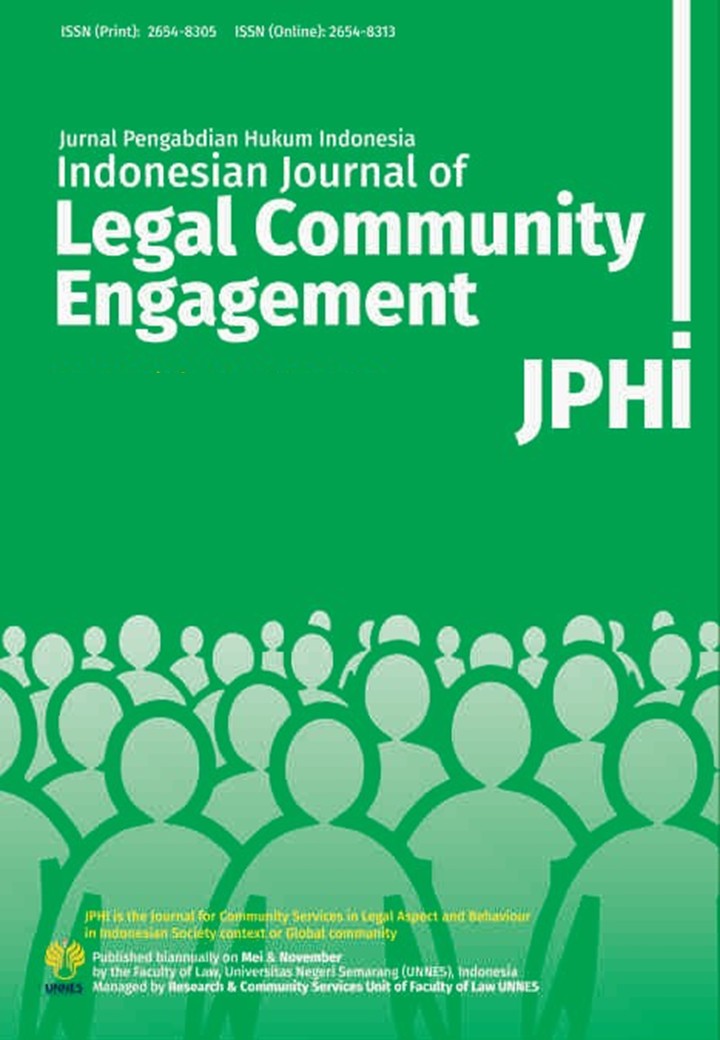Empowering the Next Generation: Bold Strategies to Combat Corruption and Foster Integrity Among Youth
DOI:
https://doi.org/10.15294/jphi.v7i1.8544Keywords:
Education, Anti-Corruption, YouthAbstract
Corruption remains a significant barrier to social, political, and economic progress globally, and the role of youth in shaping a more transparent and ethical society is crucial. This study explores effective strategies to combat corruption and instill values of integrity among young people. The research highlights the importance of anti-corruption education as a key strategy in overcoming corruption and building integrity. A collaborative effort between the Muhammadiyah Youth Branch Leader of Krembangan Branch and the Faculty of Law, University of Muhammadiyah Surabaya has led to the implementation of an anti-corruption education program in Morokrembangan Village. The primary goal of this initiative is to raise awareness, enhance knowledge, develop skills, and foster concrete actions among youth to actively fight corruption. The collaboration between youth, local government, and civil society is fundamental to the program's success, positioning it as a pioneering effort to combat corruption and build integrity at the grassroots level. The program is designed to provide participants with an in-depth understanding of the dangers of corruption and the importance of integrity in daily life. It equips youth with the practical knowledge and skills needed to recognize, report, and prevent corruption. Additionally, by involving youth in the oversight of development projects and promoting transparent community services, the program seeks to inspire similar initiatives in other regions. The study concludes by emphasizing that empowering youth through education, advocacy, and active participation is key to fostering a future generation committed to transparency, integrity, and accountability.
References
Agustinus, Panjaitan, Ismail, And Dewi Iryani. “Kepastian Hukum Terhadap Pengaturan Tindak Pidana Pencemaran Nama Baik Melalui Media Elektronik.” Setara Jurnal Ilmu Hukum 3, No. 2 (2022): 43–57.
Azfirmawarman, D., & Frinaldi, A. (2023). “Mal Administrasi Dalam Kajian Pelayanan Publik Dan Hukum Administrasi Negara: Sebuah Tinjauan Teoritis.” Jurnal Salingka Nagari 02, No. 2 (2023): 675–85. Https://Jsn.Ppj.Unp.Ac.Id/Index.Php/Jsn/Article/View/154%0ahttps://Jsn.Ppj.Unp.Ac.Id/Index.Php/Jsn/Article/Download/154/116.
Chamdani, Asri Wijayanti. “Critical Analysis About Legal Evidence In Court In The Justice System In Indonesia.” Journal Of Positive School Psychology 6, No. 2 (2022): 5867–70.
Faisal, Muhammad, And Andi Tenri Famauri Rifai. “Konsep Maladministrasi Sebagai Pembaruan Model Pengungkapan Tindak Pidana Korupsi.” Jurnal Suara Hukum 5, No. 1 (2023): 44–67.
Fauzan, Idam, Ike Rachmawati, And Dian Purwanti. “Akuntabilitas Program Gerakan Indonesia Sadar Administrasi Kependudukan (Gisa) Di Kota Sukabumi.” Jurnal Inovasi Penelitian 3, No. 2 (2022): 4785–94. Https://Doi.Org/10.47492/Jip.V3i2.1741.
Hariri, Achmad, Satria Unggul Wicaksana, And Samsul Arifin. “A Critical Study Of Legal Positivism As A Legal System In A Pluralist Country.” Kne Social Sciences 2022 (2022): 563–71. Https://Doi.Org/10.18502/Kss.V7i15.12131.
Icw. Tren Penindakan Korupsi Semester 1, 2021.
Indrawan, M, And P Permatasari. “Perlindungan Hukum Korban Penipuan Transaksi Jual Beli Online Melalui Ganti Rugi.” Jurnal Kewarganegaraan 6, No. 3 (2022): 6487–94.
Nirawati, Lufian, Slamet Muchsin, And Agus Zainal Abidin. “Peran Pemerintah Desa Dalam Menangani Masalah Masyarakat Yang Belum Memiliki Kartu Tanda Penduduk Elektronik ( E-Ktp ) ( Studi Kasus Pada Kantor Desa Sukoharjo Kecamatan Bancar Kabupaten Tuban ) Jurusan Administrasi Publik , Fakultas Ilmu Administrasi , U.” Jurnal Respon Publik 17, No. 9 (2023): 57–64.
Primadi, Agam, David Efendi, And Sahirin Sahirin. “Peran Pemilih Pemula Dalam Pengawasan Pemilu Partisipatif.” Journal Of Political Issues 1, No. 1 (2019): 63–73.
Puspita, A. C., & Gultom, Y. M. L. “The Effect Of E-Procurement Policy On Corruption In Government Procurement: Evidence From Indonesia.” International Journal Of Public Administration 1, No. 13 (2022).
Satria, H S. “Kebijakan Kriminal Pencegahan Korupsi Pelayanan Publik.” Integritas: Jurnal Antikorupsi 6, No. 2 (2020): 169–86. Https://Doi.Org/10.32697/Integritas.V6i2.660.
Setiawan, Yudhi. Hukum Administrasi Pemerintahan. Pt Rajagrafindo, 2017.
Sofia, Asriana Issa, And Pengampu Matakuliah Antikorupsi. “Masyarakat Sebagai Korban Sekaligus Pelaku Dalam Korupsi Di Sektor Pelayanan Publik,” 2020.
Sudisman, S; Febrian, F; Achmad, R. “Penegakan Hukum Tindak Pidana Korupsi Dalam Penyusunan Apbd Kab. Musi Banyuasin, Berdasarkan Putusan Pengadilan Tipikor Nomor: 48/Pid-Sus-Tpk/2015/Pn.” Doctoral Dissertation, Sriwijaya University, 2019.
Sukmana, Oman. “Konsep Dan Desain Negara Kesejahteraan (Welfare State).” Jurnal Sosial Politik 2, No. 1 (2017): 103. Https://Doi.Org/10.22219/Sospol.V2i1.4759.
Surya, Faizal Adi, And Alhamd Valo Baskoro. “Urgensi Paradigma Sosiolegal Dalam Pendidikan Tinggi Hukum Di Indonesia Alternatif Pandangan Di Era Disrupsi.” In Prosiding Seminar Nasional Dies Natalis Universitas Muria Kudus, 1:143–49, 2022.
Unggul, Satria, And Wicaksana Prakasa. “Analisis Politik Hukum Pengaruh Oligarki Dan Budaya Korupsi Di Kabupaten Bangkalan” 2, No. September (2021): 329–45. Https://Doi.Org/10.18196/Mls.V2i4.11737.
Walsham, Matthew, Hannah Kuper, Lena Morgon Banks, And Karl Blanchet. “Social Protection For People With Disabilities In Africa And Asia: A Review Of Programmes For Low- And Middle-Income Countries.” Oxford Development Studies 47, No. 1 (January 2, 2019): 97–112. Https://Doi.Org/10.1080/13600818.2018.1515903.
Wardhani, Primandha Sukma Nur. “Partisipasi Politik Pemilih Pemula Dalam Pemilihan Umum.” Jupiis: Jurnal Pendidikan Ilmu-Ilmu Sosial 10, No. 1 (2018): 57–62.
Warga, Kehidupan, Negara Pasca, And Wabah Virus. “Jurnal Pendidikan Sosial Keberagaman” 7, No. 2 (2020): 95–102.
Wicaksana Prakasa, Satria Unggul, And Agus Supriyono. “Pendampingan Hukum Umkm Berbasis E-Commerce Di Desa Jarak, Kec.Wonosalam, Jombang.” Humanism : Jurnal Pengabdian Masyarakat 1, No. 1 (2020): 23–30. Https://Doi.Org/10.30651/Hm.V1i1.4543.
Wiratraman, Herlambang Perdana, And Widodo Dwi Putro. “Tantangan Metode Penelitian Interdisipliner Dalam Pendidikan Hukum Indonesia.” Mimbar Hukum-Fakultas Hukum Universitas Gadjah Mada 31, No. 3 (2019): 402–18.
Wulandari, Nisa A’rafiyah Tri, And Umi Dayati. “Hubungan Pengetahuan Kewarganegaraan Dengan Partisipasi Politik Mahasiswa.” Jurnal Ilmiah Pendidikan Pancasila Dan Kewarganegaraan 4, No. 2 (2020): 361–67.
Downloads
Published
Article ID
8544Issue
Section
License
Copyright (c) 2024 Jurnal Pengabdian Hukum Indonesia

This work is licensed under a Creative Commons Attribution-NonCommercial 4.0 International License.
This work is licensed under a Creative Commons Attribution-NonCommercial 4.0 International License (CC BY-NC 4.0). All writings published in this journal are personal views of the author and do not represent the views of this journal and the author’s affiliated institutions.







